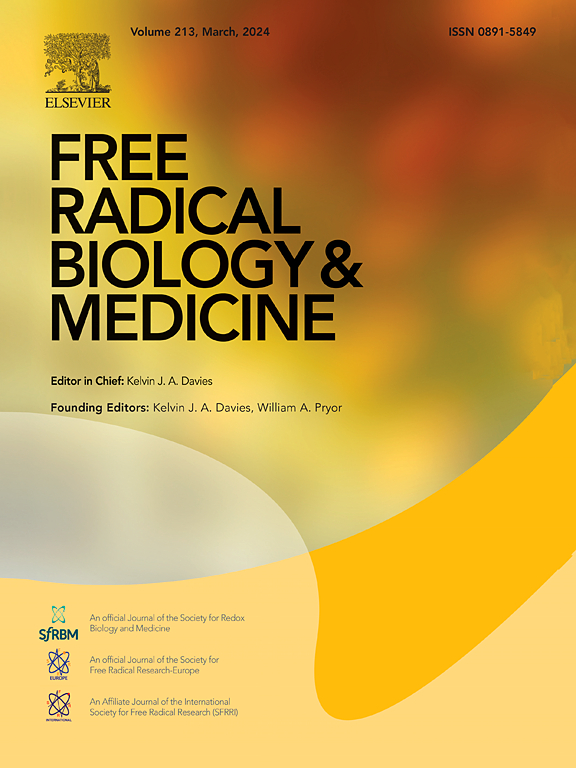Oxidative stress and central metabolism pathways impact epigenetic modulation in inflammation and immune response
IF 7.1
2区 生物学
Q1 BIOCHEMISTRY & MOLECULAR BIOLOGY
引用次数: 0
Abstract
Oxidative stress, metabolism, and epigenetics are deeply interconnected processes that collectively influence cellular function, health status, and contribute to disease progression. This review highlights the critical role of metabolic intermediates in epigenetic regulation, focusing on lactate, glutathione (GSH), and S-adenosylmethionine (SAM). Beyond its traditional role in energy metabolism, lactate modulates epigenetic mechanisms, influencing gene expression and cellular adaptation. Meanwhile, GSH and SAM serve as key regulators of DNA methylation and histone post-translational modifications, maintaining epigenetic homeostasis. These processes are tightly controlled by redox balance and oxidative stress, underscoring the intricate interplay between metabolism and epigenetic regulation. GSH depletion disrupts methylation homeostasis, while oxidative post-translational modifications (oxPTMs) on histones—including S-glutathionylation, carbonylation, and nitrosylation—alter chromatin architecture and transcriptional regulation. Additionally, we focus on histone lactylation, particularly its role in regulating innate and adaptive immune responses. We also explore how GSH and oxidative stress influence lactate levels, potentially inducing histone lactylation or S-glutathionylation through S,D-lactoylglutathione (LGSH), thereby impacting epigenetic regulation.
By integrating insights into metabolic-epigenetic crosstalk, this review underscores the role of oxidative stress and central metabolic pathways in regulating epigenetic mechanisms, a concept known as "redox epigenetics." Understanding these intricate interactions offers new perspectives for therapeutic strategies aimed at restoring redox homeostasis and metabolic integrity to counteract disturbances in the epigenetic landscape.

氧化应激和中枢代谢途径影响炎症和免疫反应中的表观遗传调节。
氧化应激、代谢和表观遗传学是相互关联的过程,它们共同影响细胞功能、健康状态并促进疾病进展。这篇综述强调了代谢中间体在表观遗传调控中的关键作用,重点是乳酸、谷胱甘肽(GSH)和s -腺苷蛋氨酸(SAM)。除了在能量代谢中的传统作用外,乳酸还调节表观遗传机制,影响基因表达和细胞适应。同时,GSH和SAM作为DNA甲基化和组蛋白翻译后修饰的关键调节因子,维持表观遗传稳态。这些过程受到氧化还原平衡和氧化应激的严格控制,强调了代谢和表观遗传调控之间复杂的相互作用。谷胱甘肽耗损破坏甲基化稳态,而组蛋白上的氧化翻译后修饰(oxPTMs)——包括s-谷胱甘肽化、羰基化和亚硝基化——改变染色质结构和转录调节。此外,我们关注组蛋白乳酸化,特别是其在调节先天和适应性免疫反应中的作用。我们还探讨了谷胱甘肽和氧化应激如何影响乳酸水平,可能通过S, d -乳酸谷胱甘肽(LGSH)诱导组蛋白乳酸化或S-谷胱甘肽化,从而影响表观遗传调控。通过整合对代谢-表观遗传串扰的见解,本综述强调了氧化应激和中枢代谢途径在调节表观遗传机制中的作用,这一概念被称为“氧化还原表观遗传学”。了解这些复杂的相互作用为旨在恢复氧化还原稳态和代谢完整性以抵消表观遗传景观干扰的治疗策略提供了新的视角。
本文章由计算机程序翻译,如有差异,请以英文原文为准。
求助全文
约1分钟内获得全文
求助全文
来源期刊

Free Radical Biology and Medicine
医学-内分泌学与代谢
CiteScore
14.00
自引率
4.10%
发文量
850
审稿时长
22 days
期刊介绍:
Free Radical Biology and Medicine is a leading journal in the field of redox biology, which is the study of the role of reactive oxygen species (ROS) and other oxidizing agents in biological systems. The journal serves as a premier forum for publishing innovative and groundbreaking research that explores the redox biology of health and disease, covering a wide range of topics and disciplines. Free Radical Biology and Medicine also commissions Special Issues that highlight recent advances in both basic and clinical research, with a particular emphasis on the mechanisms underlying altered metabolism and redox signaling. These Special Issues aim to provide a focused platform for the latest research in the field, fostering collaboration and knowledge exchange among researchers and clinicians.
 求助内容:
求助内容: 应助结果提醒方式:
应助结果提醒方式:


